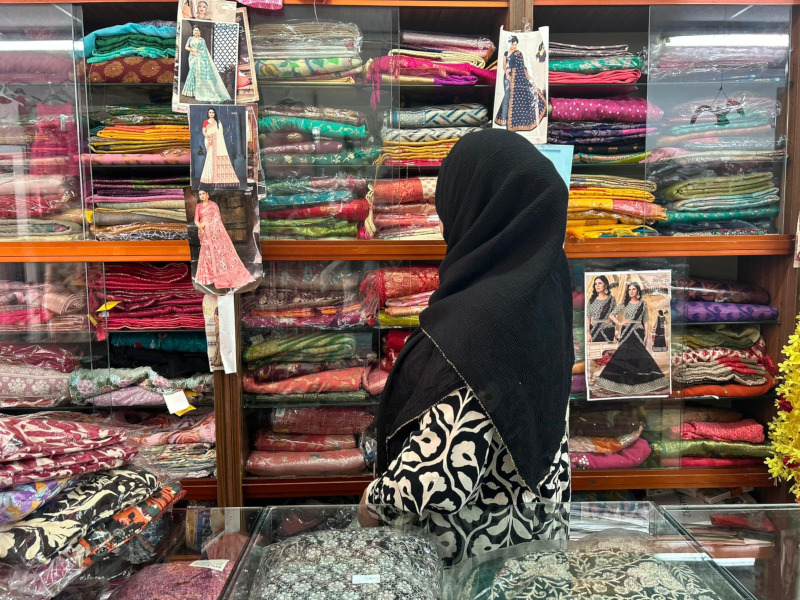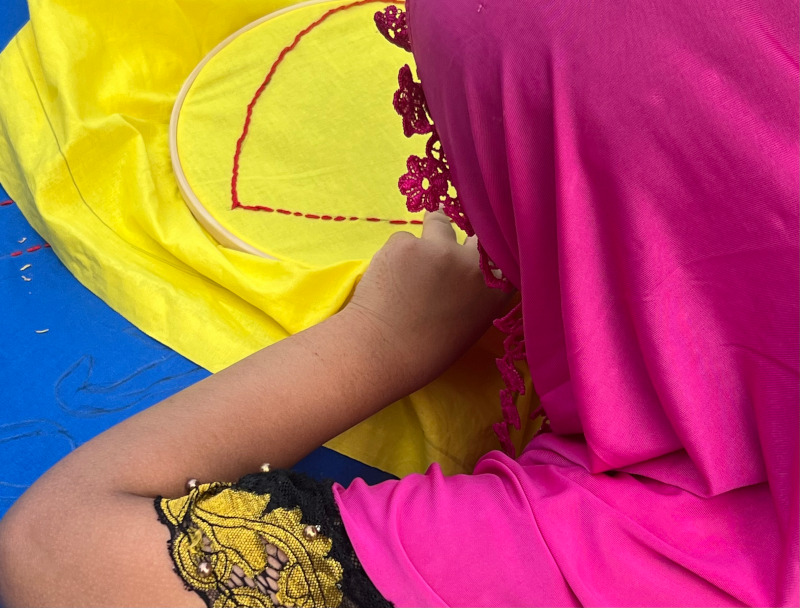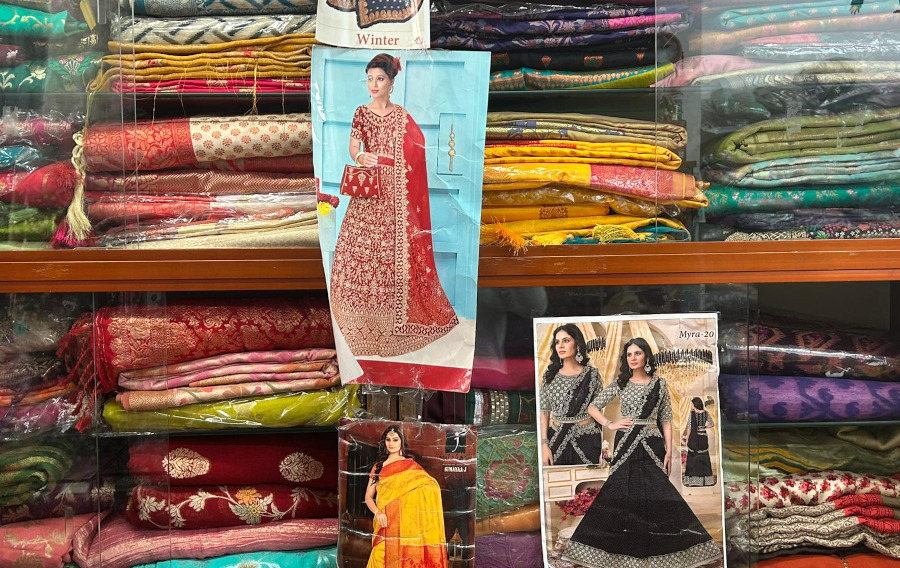They set up voluntary organizations, climb the ladder of language certificates from A2 to C1 levels, launch businesses, and take leading roles in their communities – all while trying hard to respect the traditions of their home country. The International Organization for Migration estimates that there are more than 400,000 Bangladeshi women in Europe. Many of them followed their husbands by family reunification, but a minority arrive on work or study visas.
Germany is home to 15,000 Bangladeshi residents. Although the women among them represent a small community, they have opportunities for study and employment. A more popular destination for the Bengali diaspora is Italy, where almost 100,000 are resident, half of them women. Despite being the third largest foreign community in Italy, female Bangladeshis in Italy are mostly unemployed. The reasons seem to lie in low levels of education, poor language skills, and an enduring problem of gender discrimination in both Bangladeshi and Italian culture.
Don’t talk to me, I don’t understand you
Language is the common obstacle faced by Bangladeshi women in both Italy and Germany. At a school in Monza attended by their children, women are taking an Italian-language course. Some have been resident in Italy for up to a decade already. In the words of one, Amena Begum, their goal is “to learn the words necessary to be a good mother – I am the one who goes to the teachers, so I have to understand them”. Another, Farida Yeasmin, is learning by writing poems in both languages. She shyly shows us one dedicated to the city. Looking at the original version, one can imagine the effort it took. In both the Italian and German diasporas, women are animated by the same goals.
But it is not just a question of education. Ayesha Siddika has studied to university level and lived in Bonn for four decades, but she still finds German culture and language a challenge. “Language remains the main obstacle to integration for almost all of us, and this makes many of us extremely dependent on our spouses”, she says.
Beyond the question of individual effort, there are bureaucratic differences between Italy and Germany in the way language teaching is managed. This can have an impact on the time it takes students to integrate and thus broaden their horizons. Officially, on arrival in Germany, Bangladeshis must attend compulsory state-funded language and civics lessons totalling 700 hours. After three years, they can expect considerable autonomy and an advantage in the labour market if they enter it.
In Italy, the rules on language training for foreigners are confusing, and administrative delays often mean that courses are not compulsory. Bangladeshi women sometimes spend decades without knowing Italian, and so remain functionally dependent on the men in their families.
In Rome and Monza, however, there are free language courses that have become spaces for dialogue. The NGO Intersos has created a “Safe Space” where the weekly Italian lesson is also an opportunity to get outside the home and spend a few hours among other women. Here, every word learned is a little tool of emancipation. The female staff attest that some of the women have shared stories of abuse they have suffered, and so begun a journey out of violence.
A visa or a trap?
In both Italy and Germany, the law can go some way to breaking down the language barrier. Yet while family reunification is a valuable tool for ensuring family togetherness, it also ties many women to their role of wife and so limits their paths to independence.
In the event of divorce, for example, their position may become even more precarious. Sultana, a Bangladeshi entrepreneur who has been living in Rome for years, reports stories of independence and emancipation, but also of “domineering” husbands and “young women who arrive already married and remain trapped in perpetual relationships of dependency”.

In Germany, too, many women arrive through family reunification, but in order to stay, they must demonstrate a commitment to learning the language and integrating. Despite this tentative bureaucratic “push” towards emancipation, even here the women’s visas depend on their spouses.
“Often they cannot work or learn the language, or even ride a bicycle, because their husbands do not want them to“, says Khaleda Parvin. ”It often happens that the husband accompanies his wife to the supermarket and to medical appointments, further limiting her independence.” Khaleda arrived and stayed in Frankfurt, but such situations are common elsewhere. In Bonn, Falguni Mridha talks of a “chained life” and of “Bangladeshi women who have not been allowed to return to their homeland for 30 years to see their parents and relatives, and who cannot spend their money as they wish.”
In addition to housewives who are denied the chance to get a driver’s license or learn German to an intermediate level, Falguni Mridha mentions cases of ”female Bangladeshi students who work hard to start their careers, but as soon as they get married, they give up everything to take care of the house and children.” Another common scenario: “Working women who open a joint bank account with their husbands, allowing the husband to control their every expense.”
Conveniently invisible
Some Bangladeshi women living in Germany talk of physical and verbal abuse by their spouses. This typically remains hidden “due to language barriers that prevent victims from reporting it”.
There are similar stories in Italy. Women there have told of being all but locked up, invisible to the outside world. Rome’s dense neighbourhoods may conceal much suffering of this sort. Monza is home to almost 500 female Bangladeshi residents, but there too they are often invisible. Walking through “the quarter”, as the locals call it, one does not see many South Asian women. An exception that proves the rule is Halima Naim, a separated and self-employed hairdresser. She sizes up the Italian ladies who step into her small well-kept salon, and, if she finds no judgement in their eyes, she tells them about the Women’s Corner.
Formed a few years ago, this group of Bangladeshi women provides assistance to newly arrived compatriots in Monza, helping them to find their feet in their new surroundings. This has both a practical aspect, with advice on bureaucratic matters, and a social dimension, in that it offers the newcomers company and conversation in their own language.
Such projects can be challenging: the Bangladeshi community tends to be hierarchical and male-dominated, both in Italy and Germany. Nevertheless, initiatives in Germany in particular have had some success, if only due to greater economic and cultural resources. For instance, there is a bilingual German-Bangla News Channel, and women have taken roles in numerous cultural festivals that serve to bring local people together.
Hope for change with the second generation
“We are a community only on special occasions”, says Mukta Khatun. “Otherwise we don’t see each other much. In Italy it was different, we met almost every day.” She joined her husband in Italy, where she stayed for 12 years and had two children, but she now lives with her family in Germany. Her two-step emigration gives her a perspective on both countries.
“Italy is beautiful and I miss it. I have already told my children that I want to go back there when I am old, but it was precisely because of them and my husband’s job that we moved to Germany. There was too much exploitation, zero respect for dignity and rules, poor wages, and very few opportunities for the future. I want my children to have many opportunities.“ Mukta Khatun misses Italy’s food and climate, the doctors who were ”as kind as family friends“, and the earnest generosity of Italians, who tried to communicate with her through gestures, so as ”to understand each other even without words”. In Germany, however, her husband has a steady and dignified job, her family “does not need social assistance”, and she knows that if her children study, “they will be able to choose the job they want”.
Indeed, Mukta is determined to ensure that her 12-year-old daughter also has freedoms. Born in Italy, Shaikh already speaks four languages and switches between them to help her mother communicate. She misses Italian ice cream and sunshine, and indicates with a grimace how much more “boring” Germany is, but she recognizes the advantages of living there.
This is a common trait among second-generation Bangladeshis, according to NGOs in the field. Increasingly, such nonprofits want to turn it into a lever for emancipation for the first-generation women too.
One example is the Rome nonprofit Arci Solidarietà, which organized the project FATIMA II. Its goal: to combat honour-related violence. For Lintha, 21, the initiative is a success. She arrived in Italy two years ago with her mother through family reunification, and now works in a shop and studies psychology. Lintha participated in the project because she was “interested in issues related to gender stereotypes and consent”, she says. “Not all girls are able to talk about this in their families, so it is an opportunity to share everything that causes frustration for us girls and the contrast between the two cultures. In Bangladesh, the gender gap is bigger. Among the women who have come to Italy, many decide to become housewives simply because men prevent them from going out and learning the language. This was the case of my mother.”
Lintha does not hide her irritation when people tell her, “you speak good Italian”. But she is convinced that things can change, especially with the second generation, which knows that it has “a duty to help less integrated young women feel part of the local community”
Coexistence with four hands
Hundreds of kilometres north, but also in Italy, a completely different project is taking off: “Fili di storie, ricami di pace” (“Threads of stories. embroideries of peace”). It was created by Progetto Integrazione in collaboration with teachers from the CREI (Intercultural Educational Resource Centre) of the Comprehensive Institute of Via Correggio and the Municipality of Monza, with the support of the Monza and Brianza Community Foundation.

The initiative is a hands-on project aimed at Bangladeshi women. It is somewhat unique for the fact that the women’s needs were listened to from the outset, even before the methods were decided.
“We identified the priorities as raising awareness of their culture while allowing the women to find work, and structured various activities [around this]“, says Cristina Rossi, the project coordinator. ”This started with a workshop on traditional Bangladeshi embroidery (‘katha’, meaning peace) run directly by three of the participating women.” For the women ”hired” in this way by the project, it was their first official job – not counting the years of family care that they all have behind them.
Bangladeshi embroidery turns out to be an effective exercise in concentration for the school’s young pupils. Katiuscia Melato from CREI emphasises the need to create projects specifically for Bangladeshi women, since this greatly increases their effectiveness. “We are seeing a clear strengthening of intercultural relations. This did not exist before and would never have happened spontaneously just because Italian and non-Italian mothers are in the same place at the same time. It is necessary to create, or rather co-create, opportunities.”
In the long term, “Fili di storie, ricami di pace” aims to offer women a possible career path as cultural mediators. “Bangladeshi women are particularly in demand in schools, in hospitals, in anti-violence counselling, and wherever there is a need for individuals to act as bridges between cultures”, says Rossi. “This vocation is also usually compatible with family commitments, which many of the women cannot escape. We want to get there step by step, for example by starting to open the group to other cultures, and by setting up extracurricular katha workshops, perhaps in collaboration with libraries.”
Could this project become “a true laboratory of intercultural dialogue”, as Ilura, Moriam, and Panna, three Bangladeshi participants, already describe it? “Now we want to introduce our culture to the whole of Monza”, they say proudly. In the informal chats after workshops, other ideas have come up, such as experimenting with Bengali dinners, or asking for support from the city’s branch of Arci, Italy’s main cultural organisation. Indeed, some of the women have begun to ask who is going to do the shopping and whether they will have to cook at home, or if there are the right pots and pans for their recipes. There is no date set yet, but the enthusiasm shows even from behind the women’s veils. Will their husbands find out? “Unlike me and my children, my husband refuses to eat Italian food, so I always have to cook Bengali dishes for him to keep him happy”, says Fatima. In Germany, Falguni Mridha makes a similar point: “The biggest obstacle as a Bengali community is our mentality: many still do not welcome the advancement of women. But I don’t think we’re backward, and we certainly aren’t planning to be.”
Fatima’s husband may or may not want to keep tabs on her. However, it is always helpful to meet real Bangladeshi women before writing them off as unemancipated. Sometimes we struggle to think of such people as free simply because their path in life is unfamiliar to us. These women begin with their everyday worlds, which are small (for now) – whether that is a suburb of a provincial city like Bonn or Monza, or the buzzing multiethnic neighbourhoods of Frankfurt and Rome. Yet they are striving to create their own freedoms, and increasingly they are succeeding at it.
All names are fictitious.
🤝 Article produced in collaboration with Abdul Hai and Fatama Rahman, with the support of Journalismfund Europe.

Do you like our work?
Help multilingual European journalism to thrive, without ads or paywalls. Your one-off or regular support will keep our newsroom independent. Thank you!
















